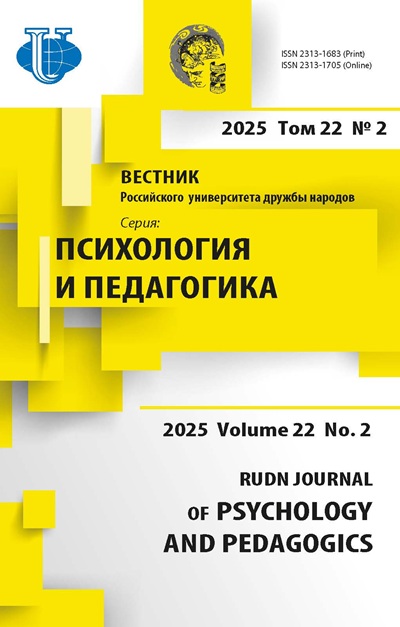Проблема эмоционального интеллекта и его связей с эффективностью профессиональной деятельности в зарубежной литературе
- Авторы: Яглова О.В.1
-
Учреждения:
- Российский университет дружбы народов
- Выпуск: № 1 (2013)
- Страницы: 80-85
- Раздел: Статьи
- URL: https://journals.rudn.ru/psychology-pedagogics/article/view/8071
- ID: 8071
Цитировать
Полный текст
Аннотация
В статье рассматриваются различные подходы к определению и изучению эмоционального интеллекта, приведены основные направления критики конструкта, обоснована актуальность проведения дополнительных исследований эмоционального интеллекта в контексте профессиональной деятельности.
Об авторах
Олеся Владимировна Яглова
Российский университет дружбы народов
Email: o.yaglova@gmail.com
Кафедра социальной и дифференциальной психологии
Список литературы
- Akerjordet K., Severinsson E. Emotional intelligence: A review of the literature with specific focus on empirical and epistemological perspectives // Journal of Clinical Nursing. — 2007. — V. 16. — P. 1405—1416.
- Ashkanasy N.M., Daus C.S. Emotion in the workplace: The new challenge for managers // Academy of Management Executive. — 2002. — V. 16. — P. 76—86.
- Ashkanasy N.M., Daus S.C. Rumors of the death of emotional intelligence in organizational behavior are vastly exaggerated // Journal of Organizational Behavior. — 2005. — V. 26. — P. 441—452.
- Bar-On R. The Bar-On Emotional Quotient Inventory (EQ-i): Technical Manual. — Toronto: Multi-Health Systems, 1997.
- Bastian A.V., Burns R.N., Nettelbeck T. Emotional intelligence predicts life skills, but not as well as personality and cognitive abilities // Personality and Individual Differences. — 2005. — V. 39. — P. 1135—1145.
- Cherniss C. The business case for emotional intelligence. Graduate School of Applied and Professional Psychology, Rutgers University. 1999. [Электронный ресурс]. — URL: http://www.eiconsortium.org/pdf/business_case_for_ei.pdf (дата обращения 05.03.2012).
- Cherniss C., Extein M., Goleman D., Weissberg P. R. Emotional intelligence: What does the research really indicate? // Educational Psychologist. — 2006. — V. 4. — P. 239—245.
- Cherniss C., Goleman D., Emmerling R. Bringing emotional intelligence to the workplace. — Rutgers, NJ: Consortium for Research on Emotional Intelligence in Organizations, 1998.
- Consortium for Research on Emotional Intelligence in Organizations. [Электронный ресурс]. — URL: http://www.eiconsortium.org (дата обращения 10.10.2012).
- Fambrough M.J., Hart R.K. Emotions in leadership development: A critique of emotional intelligence // Advances in Developing Human Resources. — 2008. — V. 10. — P. 740—758.
- Gardner H. Intelligence reframed. — New York, NY: Basic Books, 1999.
- Goleman D. Working with emotional intelligence. — New York, NY: Bantam Books, 1998.
- Holt S., Jones S. Emotional intelligence and organizational performance: Implications for performance consultants and educators // Performance Improvement. — 2005. — V. 44 (10). — P. 15—23.
- Landy J.F. Some historical and scientific issues related to research on emotional intelligence // Journal of Organizational Behavior. — 2005. — V. 26. — P. 411—424.
- LaPierre E. The importance of emotional intelligence. 2009. [Электронный ресурс]. — URL: http://www.stoneandcompany.com/article.asp?PageID=2964 (дата обращения 08.02.2010)
- Lindebaum D. Rhetoric or remedy? A critique on developing emotional intelligence // Academy of Management Learning & Education. — 2009. — V. 8. — P. 225—237.
- Locke A.E. Why emotional intelligence is an invalid concept // Journal of Organizational Behavior. — 2005. — V. 26. — P. 425—431.
- Matthews G., Zeidner M., Roberts R.D. Emotional intelligence: Science and myth. — Cambridge, MA: MIT Press, 2002.
- Mayer J.D., Salovey P. What is emotional intelligence? // P. Salovey, D. Sluyter (Eds.). Emotional development and emotional intelligence: Implications for educators. — New York: Basic, 1997.
- Murphy K.R. A Critique of Emotional Intelligence: What Are the Problems and How Can They Be Fixed? — Mahwah, NJ: Erlbaum, 2006.
- Reiff B.H., Hatzes M.N., Bramel H.M., Gibbon T. The relation of LD and gender with emotional intelligence in college students // Journal of Learning Disabilities. — 2001. — V. 34. — P. 66—78.
- Rummler G.A., Brache A.P. Improving performance: How to manage the white space on the organization chart (2nd ed.). — San Francisco, CA: Jossey-Bass, 1995.
- Van Rooy D.L., Viswesvaran C. Emotional intelligence: A meta-analytic investigation of predictive validity and nomological net // Journal of Vocational Behavior. — 2004. — V. 65. — P. 71—95.
- Zeidner M., Matthews G., Roberts R.D. Emotional intelligence in the workplace: A critical review // Applied Psychology. — 2004. — V. 53. — P. 371—399.
Дополнительные файлы














